Investigative Stories
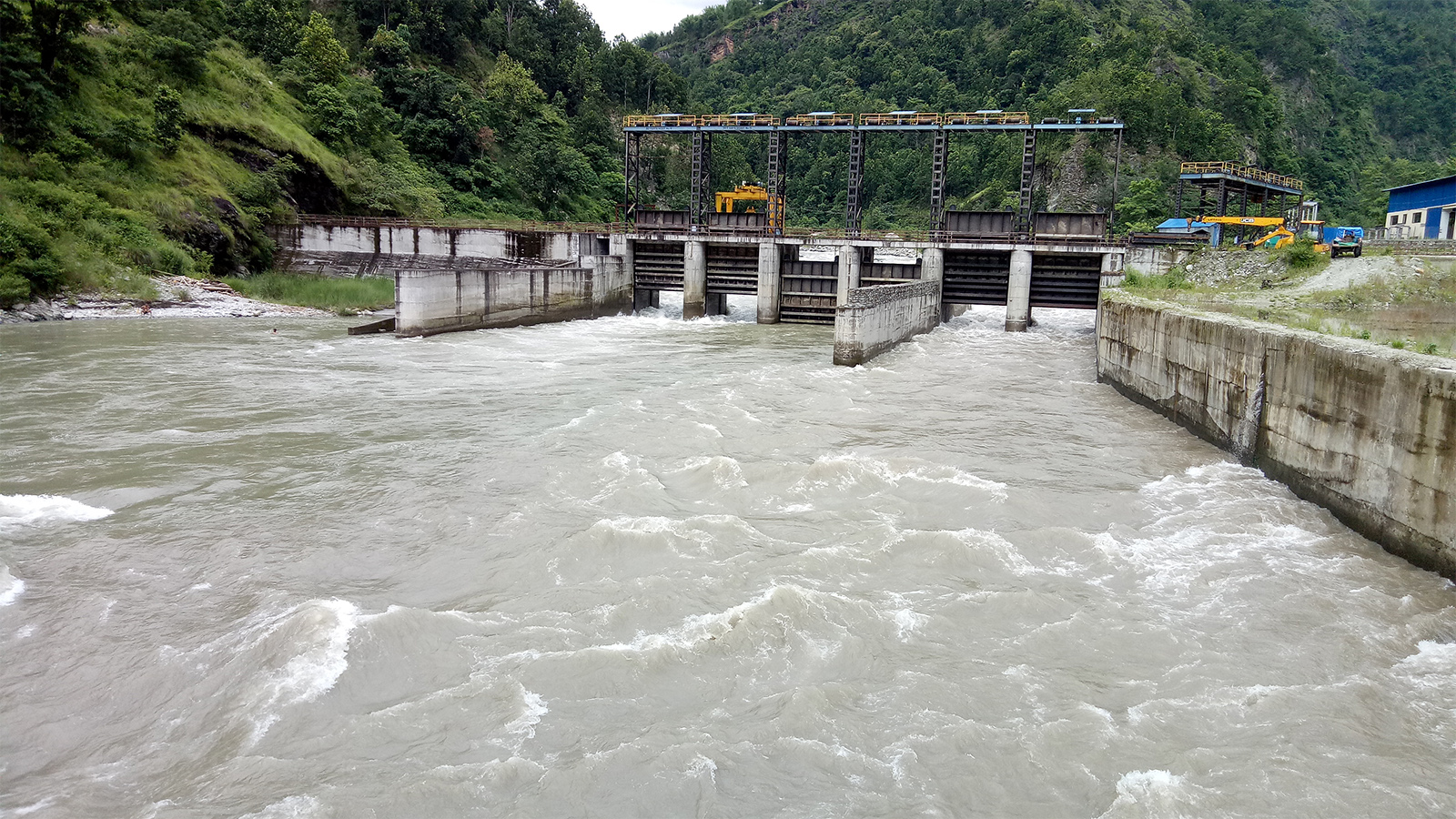
The Ankhu Khola-1 Hydropower Project, which started producing electricity 11 years ago, has not provided a dividend to its investors yet. The Ankhu Khola Hydropower Company, which is the promoter of the 8.4 MW project, has yet to pay back loans amounting to Rs 710 million taken from various banks and financial institutions.
According to existing laws that mandate hydropower projects to come under government ownership 35 years after they get an operation permit, this project will belong to the government after 20 years from now. It is, however, not certain whether the project would earn profit before that and provide dividends to investors. The project had received a permit for electricity production in 2066 BS.
While the general public purchases its shares at Rs 100 per unit, its net worth per share has declined to Rs 84.14 now. Its promoter company doesn’t have another project to fall back on either.
Once the project is handed over to the government, the shares owned by the general public would amount to nothing as the company risks losing its value.
The 5 MW Mailung Khola Hydropower Project in Rasuwa will also be handed over to the government in Chaitra 2094 BS. But its shareholders have only received a 2.33 percent dividend including cash and bonus shares. This company also doesn’t have another project. And once it comes under government ownership, the shares risk being valued nothing.

The private sector has constructed dozens of hydropower projects in Nepal and many are under construction. The general public have invested a lot of money in these projects. But due to a lack of institutional good governance, they have received negligible returns. Instead, their investment risks going to waste after the projects come under government ownership. Companies owning only one project risk getting closed after the project belongs to the government.
Niraj Giri, former executive director of Securities Exchange Board of Nepal (SEBON), says that most of the companies producing power in Nepal own only one project. And after the project comes under government ownership, the value of the shares amount to zero with the companies having no other projects at hand. “In that situation, the general public won’t get a return to their investment,” Giri says.
Operators of the companies are abandoning them
The founders and operators of many of these companies have been selling their shares at the secondary market upon the end of the lock-in period and abandoning the companies. This has further raised the risk to the investment of the general public.
A study conducted by SEBON a year ago showed that operators of 20 listed companies had sold most of their shares upon the end of the lock-in period and left behind the companies.
When that happens, it would cause problems in the companies’ operation and would also erode the trust among the investors, the study report had pointed out.
The study also showed that the companies’ founders tend to show a higher investment, take out loans more than the capital and issue primary shares to operate the companies.
Ankhu Khola is among such companies pointed out by the SEBON. The project had an initial estimated investment of Rs 1 billion 200 million but when it was completed the investment rose to Rs 2 billion 420 million. Of its seven founding operators, six have already sold off their shares, according to the study.
The report has further pointed out a very high loan to capital ratio of those companies, meaning the founders invested more out of bank loans than out of their pockets in the companies. They also tend to collect the amounts through selling primary shares and right shares and pay back bank loans.
For instance, the SEBON provided the permission to issue right shares to Ankhu Khola in Asar this year. The company collected Rs 1 billion 200 million by issuing 1.5 units of shares per 1 primary shares.

The company should have been punished for making a mockery of institutional good governance. It has been proven that chair Ram Shrestha of the company’s operation committee and operators Dinesh Prasad Shrestha and Ram Prasad Sapkota had sold their shares in the secondary market illegally. The company should have been allowed to issue right shares according to a recommendation by the study committee formed by SEBON last year to improve the hydro companies’ share structure and institutional governance.
The committee, led by the then joint secretary of the Ministry of Law, Justice and Parliamentary Affairs Phadindra Gautam, had recommended barring hydro companies with net worth lesser than their paid-up capital from issuing right shares.
Before it issued right shares, Ankhu Khola’s net worth per share stood at just Rs 69.44. If the recommendation of the study committee was followed through, the company wouldn’t have been allowed to issue right shares.
Moreover, SEBON has recently granted permission to issue right shares to Balefi Hydropower Project, which has a net worth per share of Rs 49.93, and also to Liberty Energy, with a Rs 59.74 net worth per share.
Hydro companies that haven’t distributed a penny in dividend to shareholders have been issuing right shares to pay back bank loans. Currently, over a dozen hydro companies are awaiting permission to issue right shares. The Electricity Regulatory Commission has been granting permission to issue right shares to even companies with poor financial status.
Investors left empty-handed
Khani Khola Hydropower Project, which was registered in the secondary market seven years ago, hasn’t distributed dividends to its shareholders yet. Its net worth per share currently stands at just Rs 79.79.
Of the 91 companies listed in Nepal Stock Exchange, only 35 have distributed dividends to their shareholders. The number of those providing dividends regularly is even fewer. Chilime Hydropower Company is one of them. It has so far provided 149 percent cash dividend and 245 percent bonus shares.
The Butwal Power Company Limited is another. It has distributed 196.5 percent cash dividend and 52 percent bonus shares.
Of the five companies that have heavy influence of Guru Prasad Neupane, who has been convicted in money laundering and insider trading cases, and his family, two, Api Power and Arun Valley Hydropower, have issued right shares four times. Likewise, Arun Kaweli Power Company and Ridi Power Company, both of which are also influenced by Neupane, have issued right shares once each.

These companies have, however, failed to provide satisfactory dividends to their shareholders. Api Power has distributed only 55 percent bonus shares in its 10-year history while Ridi has provided 40 percent bonus shares in 23 years. Arun Kaweli has distributed 32.71 percent bonus shares in 12 years. Arun Valley Hydropower Company has provided only 93 percent bonus shares in 24 years since it started producing electricity. It has distributed cash dividends for tax purposes only. Ingwa Hydropower hasn’t provided any dividend in three years.
Likewise, the National Hydropower has distributed only 18.2 percent bonus shares in its 27-year history.
Neupane, who has faced punishment, still remains the chair
On 25 December, 2022, SEBON punished Guru Prasad Neupane by barring him from being an operator of a public company for 10 years. Despite that, however, Neupane still holds the position of chair at Arun Kabeli Power Limited.
Ganesh Karki, chair of Independent Power Producers’ Association, says that there should be a thorough investigation into the operations of such hydropower companies and their financial dealings.
“How is the investment collected from the general public being used? Is it being spent in the right way or wrong? The electricity regulatory commission should consider these things, monitor and regulate the companies,” Karki says. “Companies should be punished if found to be engaged in irregularities. But instead, they are being protected.”
Murahari Parajuli, spokesperson of NEPSE, says that the companies are fooling the shareholders by offering their bonus shares. “In mature markets, investors want cash dividends but in Nepal, they are attracted towards bonus shares, which remains only on paper.”
Generally, a company issues right shares if it has to carry out a new work. But in Nepal, hydro companies are influencing the weak regulatory body to do whatever they please, says Madhav Koirala, a hydropower expert. “The Office of the Auditor General looks at all the reports of government companies. Because they have to be responsible to the parliamentary Accounts Committee, they remain cautious to avoid irregularities,” Koirala says. “But private companies are responsible to no agency and do whatever they please.”
Operators rejoicing in other people’s money
Guru Prasad Neupane, who was convicted in an insider trading case, is the founding investor of Ingwa Hydropower Company, which raised Rs 180 million from the general public. His wife, Sumitra Devi Neupane, is the chairperson of the company. His eldest son Satish Neupane and youngest son Sanjeev Neupane are the operators. Bhej Prasad Timilsina, also Neupane’s relative, is appointed as independent director.

The hydro project, which has taken permission to produce 9.7 MW electricity from Ingwa Khola, which falls in Panchthar and Taplejung, had issued IPO in 2079 BS.
Neupane’s family heavily influences the Api Power Company as well. Neupane’s youngest daughter-in-law Sirjana Khadka is the company’s chair, while his youngest son Sanjeev Neupane and his brother-in-law Milan Khadka are the operators. Relative Dwarika Prasad Neupane is another operator while Madhusudan Koirala is the appointed operator from among independent investors. Of the five-member operation team, four are from the Neupane family.
Srijana Khadka has received an allowance of as much as Rs 245,000 in a month from the company. Her husband, Sanjeev Neupane, received Rs 4 million 277 thousand 672 in salaries and allowances last fiscal year. Sanjeev is also the operator of the Ingwa Khola project. He receives salaries and allowances from that company as well.
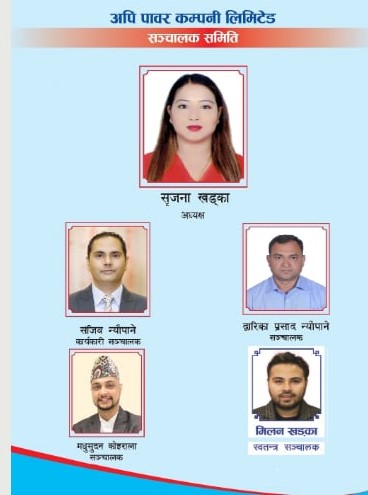 Last fiscal year, Him Prasad Pathak of Sahas Urja Limited received Rs 5 million 695 thousand in salary and 120 thousand in allowances. The company has Arjun Thapa as general manager. Thapa has received Rs 3 million 559 thousand 500 in salaries and Rs 80,000 in meeting allowances. The company has collected Rs 1 billion 50 million through IPO issued in 2077 BS. The company distributed 8 percent bonus shares last year and 0.41 percent cash dividend for tax purposes.
Last fiscal year, Him Prasad Pathak of Sahas Urja Limited received Rs 5 million 695 thousand in salary and 120 thousand in allowances. The company has Arjun Thapa as general manager. Thapa has received Rs 3 million 559 thousand 500 in salaries and Rs 80,000 in meeting allowances. The company has collected Rs 1 billion 50 million through IPO issued in 2077 BS. The company distributed 8 percent bonus shares last year and 0.41 percent cash dividend for tax purposes.
Likewise, chair of National Hydropower Company, Kumar Pandey, receives a yearly salary of Rs 6 million 53 thousand. Pandey, however, owns only 1,876 units of shares in the company. In its 27-year history, the company has distributed bonus shares to shareholders only once. Meanwhile, Somath Sapkota, an operator who owns 356 units of shares at the company, received Rs 310,000 in allowances last year. There are many such evidences of the company operators taking allowances as per their will.
At the Siklesh Hydropower Company, which is also constructing the 13 MW Madkhu Khola Hydropower Project, the spouses are on board of directors—Prem Kumari KC is the chair while her husband Roshan KC is an operator. Roshan is also the chair of Machhapuchhre Bank’s board of directors. While there is a provision barring individuals from a single family to hold decision-making positions at banks and financial institutions, there is no such provision in the hydropower sector.
“There are many instances where individuals from a single family are enjoying salaries and allowances out of shareholders’ money,” Giri, the former executive director of SEBON, says.
Ganesh Karki, chair of IPPAN, says that there have been irregularities in hydropower companies. “There should be a strong regulatory body to control this,” he says.
Lack of transparency
Lack of transparency is a major problem among hydropower companies. Many companies haven’t even conducted an audit for long. According to Securities Act 2063 BS, companies that trade shares in the secondary market should publish their complete financial documents in a way that is accessible to all. But many companies have flouted this law.
For instance, Khani Khola Hydropower Company and Barun Hydro Power Company haven’t conducted an audit for a long time. And the list of such companies runs long, IPPAN officials say.
Weak regulatory body
While the problems of the hydropower sector deepen, the regulatory body Electricity Regulatory Commission has been unable to carry out its duty. The commission’s chair Dr Ram Prasad Dhital says that his office has yet to formulate a criteria to ensure institutional good governance in the hydropower sector.
“So far, various agencies such as Company Registrar’s Office, SEBON, and Department of Electricity Development are monitoring the hydropower companies,” Dhital says. “We plan to fully regulate them ourselves from now onwards.”
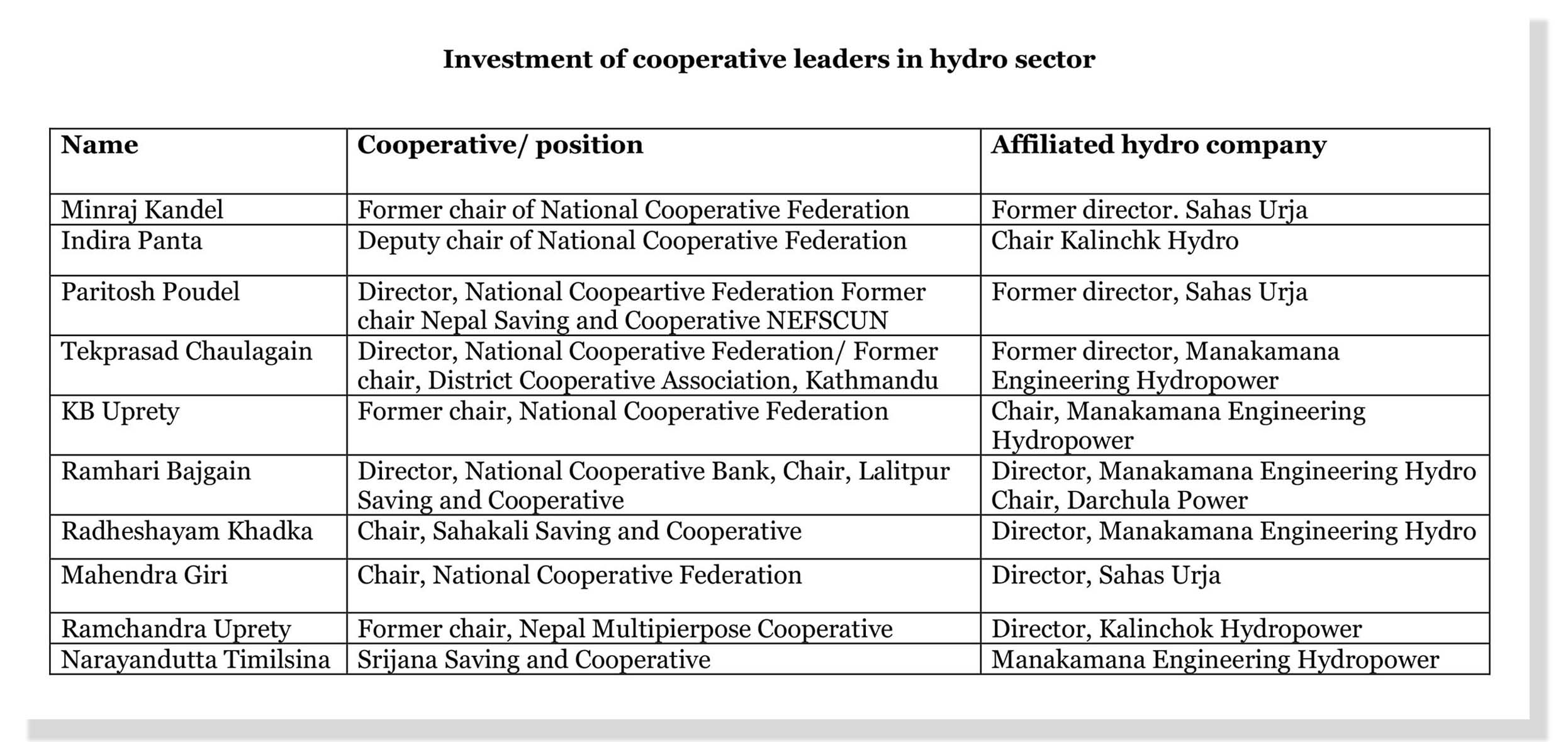
Dhital adds that the commission is gearing up to formulate a criteria to fix the qualifications to invest in the hydro sector, ensure institutional good governance and code of conduct, among others.
Karki, the IPPAN chair, also says that there should be regulation and monitoring to curb the irregularities in the hydro sector. “We have alerted authorities about it repeatedly,” he says, adding that it’d be best if a single authority did the job.
Cooperative money being channeled to hydropower sector

While embezzlement of cooperative funds continue to dominate the news cycle, it’s been found that cooperative funds are also being channeled to the hydropower sector.
As much as Rs 373 million 433 thousand 601 of Laligurans Multi-purpose Cooperative has been invested in Bhairabkunda Hydropower Limited. The then chair of the cooperative Surendra Bhandari has also invested Rs 20 million in the hydro company, according to the report of the special parliamentary committee formed to probe cooperative fraud. Bhandari, who was arrested on charge of cooperative fraud, was released on bail from Dillibazar jail a few months ago.
Many office bearers of the National Cooperative Federation have also invested in hydropower companies. While their source of monthly income was not found, they have claimed that they invested their private money.
“As the Cooperative Act has allowed private investment, those in positions of power in cooperatives are taking loans from cooperatives and are investing in the hydropower sector,” Sudarshan Dhakal, former registrar of the Cooperatives Department, says. The question of whether one can invest cooperative funds in companies is a moral one, he adds.
Raghunath Mahat, information officer at the Cooperatives Department, says that it is not appropriate for cooperative leaders to invest in private companies as that amounts to conflict of interest.
However, Omdevi Malla, chair of the cooperative federation, says that she is not aware of the cooperative leaders’ investment in private companies, including hydropower companies. “I don’t have any investment in private companies and I don’t know about others’ either,” she says.
Dhakal, the former registrar, warns that if the hydropower sector is not regulated timely, it would face a crisis similar to that of cooperatives. “The cooperative sector faced the crisis because of the operators’ high-handedness,” he says. “That same problem is beginning to appear in the hydropower sector.”
More Investigative Stories
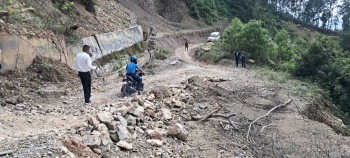
In Koshi Province, DPRs worth millions for projects never to be built
Many detailed project reports (DPRs) prepared by the Koshi provincial government at the cost of tens of millions are shelved....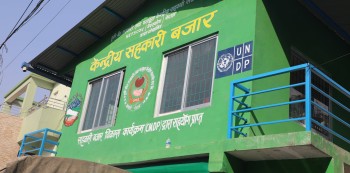
Uncooperative cooperatives
A Rs1 billion project aimed at promoting farmers failed due to mismanagement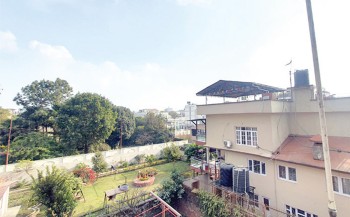

Comment Here